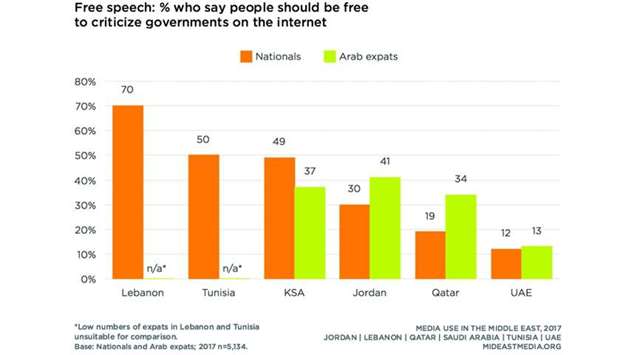NU-Q’s Media Use in the Middle East survey is a longitudinal study that explores patterns of news use, perceptions of news bias, and attitudes toward free speech in seven Arab countries: Qatar, Jordan, Lebanon, Tunisia, Egypt, Saudi Arabia and the UAE.
In 2017, nearly six years since the uprisings of the Arab Spring, people’s opinions about free speech online - what they should be able to say versus what they can safely say - varied widely across the region, with higher levels of tolerance for public criticism of governments in countries such as Lebanon and Egypt. Meanwhile, less than half of nationals in Jordan, Qatar, Saudi Arabia, and the UAE tolerate government criticism.

“We’ve found significant differences between how nationals perceive free speech and open criticism of governments across the region,” said Everette E Dennis, dean and CEO. “One example is that although two-thirds of Lebanese nationals support the right to publicly criticise government policies, nationals in Qatar, Saudi Arabia, and especially the UAE represent the opposite end of the spectrum, with nearly one-quarter of Qataris and Saudis and only 14% of Emiratis believing people should have the freedom to criticise government policies.”
Other patterns that emerged included differences based on education and age. Those with the lowest education (primary or less) are the least likely to agree that people should be able to express unpopular ideas, criticise government, or speak their minds about politics online—nearly 20% less than those with higher levels of education.
“The older generation of nationals, meanwhile,” Dennis added, “was more reluctant to agree with the freedom to express unpopular ideas or criticise their government. Another area where a pattern emerged was with those who identified themselves as progressive rather than conservatives and who were more inclined to support free speech.”
In Qatar, the survey found that citizens are much less likely than other Arab nationals to say people should be able to criticise government online – only 19% of Qataris were supportive, as opposed to 48% of other Arab nationals supporting criticism of their government online.

A recent regional survey, conducted by Northwestern University in Qatar (NU-Q), found that Arab nationals are more likely to find criticism of government acceptable than criticism of religion.


